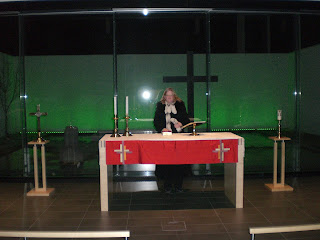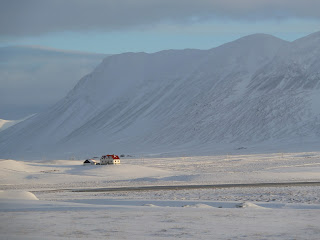Crime novels set in Greenland: Christoffer Petersen
My last two blog posts described my researches in Greenland for my novel The Wanderer. Compared to Iceland, there are very few crime novels set in Greenland that are available in English. The only author I know of who writes these is the British-Danish crime novelist Christoffer Petersen.
His books feature the Greenlandic detective constable David Maratse and give a terrific picture of life – and death – in Greenland. Chris himself spent seven years living in Greenland and his knowledge and understanding of the country and its people shine through. They are fascinating novels, and great murder mysteries too.
I asked Christoffer to post here about living in and writing about Greenland:
Greenland. Where to start? I could begin by saying that Greenland was never on my radar. I grew up on Jack London stories, devouring them and everything else remotely connected to them. I developed a passion for the Arctic as a teenager, and it has consumed me for much of my life, guiding my decisions and leading me ever further north. I was supposed to follow in London's footsteps and go to Canada or Alaska. I was supposed to drive my dog sledge through forests. But when studying at the University of Strathclyde in Glasgow, Scotland, a Rolex advert in National Geographic featuring the Danish Sirius Sledge Patrol in Northeast Greenland changed everything, and I adjusted my sights. Some twenty years later, my Danish wife and I landed by helicopter on the remote island of Uummannaq, 370 miles north of the Arctic Circle with a population just over 2,000. There were plenty of icebergs. Not a single tree.
My 'furthest north' was Qaanaaq, a remote village of 600 people, just 800 miles from the North Pole, and north of the American Pituffik Space Base (Thule Air Base), from which the people of Qaanaaq had been forcibly displaced many years earlier. Jane and I lived there for two years. In all, we spent seven years in Greenland, and for different reasons, they were the toughest and most memorable years of our lives. They have shaped my writing, and, in no small measure, those years in the Arctic have shaped me and my outlook on the world.
The curious thing about writing about Greenland is that many people confuse it with Iceland. Readers have even left reviews on my books about Greenland, saying how much they enjoyed reading about Iceland. I think it's very easy to forget about the big island north and west of its smaller neighbour. In fact, a Greenlandic friend of mine once mentioned travelling to Greece on an exchange. When the teachers in the receiving school brought out the school atlas to show the kids where my friend lived, she was forced to point at a big blank white space on the map where Greenland should have been. Only it wasn't there.
"Ah, we thought it was just ice," the teacher reportedly said.
Ice. There is a lot of it. More, in fact, than in Iceland. A lot more.
The Danes have hundreds of years invested in Greenland, for better and worse. It was formally recognised as a Danish colony in 1814, when the Danes wrested it from the clutches of the Norwegians, and currently has an autonomous status within the Kingdom of Denmark. However, it's not difficult to forget about Greenland, or to get in a muddle when talking about it. A simple preposition often relegates Greenland, and its population of roughly 56,000 inhabitants, to a lesser land. The Danes say people live 'on' Greenland as it is an island after all. The Greenlanders say they live 'in' Greenland. It is their country, after all. Curiously, while writing this post, Word wanted me to write 'in' Iceland, not 'on'. And yet, is Iceland not an island? The Danish spelling of Iceland is 'Island', suggesting that it is. But semantics aside, Greenland is an imperceivably big country. The population, however, as I often mention in the author's notes in my books, can fit comfortably inside Dodger Stadium, the baseball park in Los Angeles, USA. It's no wonder Trump suggested he could buy Greenland. Nobody lives there. Right?
The people who do live in Greenland live on the coast, with the greatest concentration of inhabitants on the west coast. Nuuk, the capital, has a little under 20,000 people. It is a modern city boasting everything from Northern Lights, humpback whales, a university, and the best espresso money can buy in the far north. In some of the smaller settlements, you will find anywhere from 30 to a couple of hundred people. While I lived in Qaanaaq, the last two residents of the nearby settlement of Moriusaq relocated to the village. They were father and son. The son maintained the small electricity station, powering the settlement. Moriusaq also had a shop, water, and a lot of empty houses. Moriusaq was actually quite big and full of amenities when compared to the smallest of Greenland's populated areas.
Nuuk is a city. There are several towns. Then there are villages and settlements. The smallest populated area is what's called a bosted in Danish, and najugaq in West Greenlandic. I worked as a teacher in Greenland and had the pleasure of grading a teenager from a tiny najugaq in his English oral exam when I flew to Upernavik as an external examiner. The boy and his brother were self-taught until they moved to the small town of Upernavik for their last year of school. When I say self-taught I really mean it. There was no teacher where they lived, and they were not home-schooled as we might understand it. The boy had a strange accent when he spoke English, but his teacher and I gave him the highest grade, as there was nothing wrong with his grammar or vocabulary. The boy's parents spoke neither Danish nor English. He learned English from video games and DVDs. There was no Internet where he lived.
Greenlanders have been the subject of Danish prejudice and racism in one form or another for a long time. Not all Danes look down on Greenlanders, but the media often has a negative slant, and there are many legal sinkholes within which Greenlanders can get trapped within the Danish system. But for those Danes who spend a significant amount of time in Greenland -- and I include myself as one of them -- their appreciation of Greenlanders, their culture, and their country, is influenced by stories of determination, progress, and triumphs in the face of overwhelming odds, such as the story of the boy getting top grades in English.
The Danish media often forget to report such triumphs, although they are getting better at doing so. But they never mention the social dumping that occurs when Danes who are wholly unsuited to work in Denmark, often due to alcoholism, wind up in Greenland. You might wonder how that can happen, and the simple answer is there are not enough qualified people to fill positions in Greenland. They, the Greenlanders, are at the mercy of imported workers, and I would be remiss not to accept that I was one of them. That is to say an imported worker, not an alcoholic. Alcoholism is a problem in Greenland, as it is in many parts of the world, not least Denmark. It's just more visible when there is only one store in a small village from which to buy your booze, and everyone can see you doing it.
One post about Greenland will never be more than a glimpse into what I know is one of the most fascinating, inspirational, dramatic, tragic, and uplifting countries in the world. I think of it as a land of firsts, as there are so many things I did for the very first time in Greenland, and never again. There is a danger of thinking of Greenland as exotic, as different, and something else. This was evident when a Danish friend of mine announced that he and his wife and their one-year-old boy were coming to visit Jane and me in Uummannaq in winter. The sun had yet to return, and the temperature was often below minus 20 degrees Celsius. His friends urged caution, thinking that it was reckless to take their baby boy to the Arctic.
I think my friend's response sums it up rather well.
He said, "I'm quite sure they have children in Greenland, too."
They do, and I was privileged and fortunate to teach a whole bunch of them.
Michael and I write crime stories set in cold, Arctic countries. We do our best to bring those countries alive through stories. The stories we write include terrible crimes and mysteries to be solved. But you know what? In my opinion, the real mystery is that so very few people know about Greenland, the real Greenland. But as the world heats up -- climatically and politically -- I guarantee that Greenland will be on the lips of people all over the world. And that last blank white space on the map will be restored.
And, as they say, watch 'that' space.
Better still, go see it for yourselves.
I recommend seeing Greenland. I also recommend reading Chris's books. The first four of the David Maratse books are published as an omnibus on Kindle.
Christoffer Petersen's website is at christoffer-petersen.com and his Substack is at christofferpetersen.substack.com .
If you would like to receive a free copy of my own 60-page novella The Polar Bear Killing and occasional emails about my books, sign up here.





Comments
Post a Comment